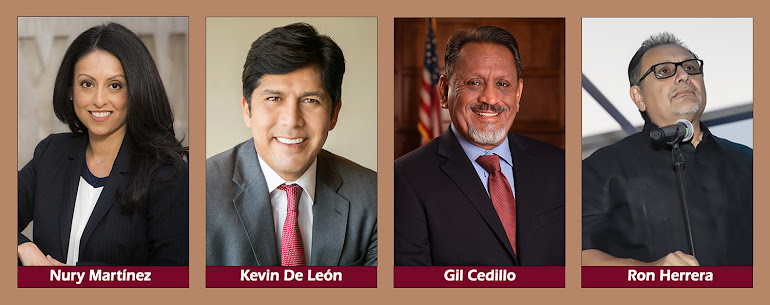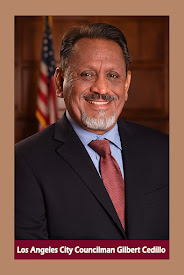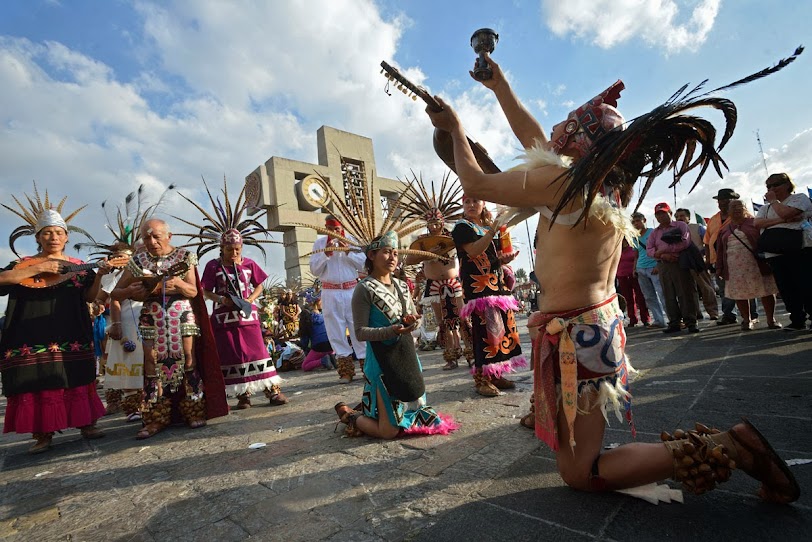L.A. Audiogate OP-ED: What the Media Feeding Frenzy Failed to Address and What Healing L.A. Will Require of Us All
A BROOKLYN & BOYLE POINT/COUNTERPOINT EXCLUSIVE
Guest Editorial by Jorge H. Rodríguez
The words spoken by several prominent elected Mexican, Latin@ officials were prejudicial, discriminatory, outright mean, and just plain hurtful to everyone they were directed at. But they were not expressed by racists, or white supremacists as some people who have written or spoken about this unfortunate incident have claimed.
The distinction is that white supremacy refers to an ideology, a set of ideas promoting the supremacy of whites over people of color; while racism refers to the institutionalization of white supremacy, how it manifests structurally in our society, especially through governmental, educational and socio-political institutions, such as schools, entertainment, laws, and so on. Yes, they were acting like privileged people without regard to those spoken about. But Martínez, Cedillo, De León and labor leader Herrera are neither racists nor white supremacists.
To cast them as such indicates a lack of understanding of what racism is. Racism has been perpetuated by the dominant class and culture in the United States. For centuries, this class has exercised near absolute control over the social, economic and political well-being of this society, the lives of women, working people, the indigenous population and people of color. One of those promoting this practice and executing it through institutions is former President Trump. The remarks that opened his campaign were a vicious attack against Mexicans, misogynistic attacks against women, physically challenged people, and additional attacks on other people of color.
We know the social and political history and the core values embodied by Martínez, Cedillo, De León and Herrera. Cedillo, along with former Mayor Villaraigosa, and Senator Durazo were all part of CASA, a national immigrant workers rights organization which fought for 15 years from 1972 to 1986, to win amnesty for ALL immigrants in the U.S., a struggle which culminated with the passing of the 1986 Amnesty IRCA Law signed by former President Reagan. In 1994 Cedillo—then the leader of SEIU Local 660—along with the LA Federation of Labor spearheaded the fight against Governor Wilson’s anti-immigrant proposition 187.
All of the elected Mexican/Latina@ elected officials participated in the mega-immigration marches of 2006, one on March 25, as well as the globally acknowledged “Day Without An Immigrant,” May 1, 2006 when over 1.5 million people marched along the streets of downtown Los Angeles and millions more across the country demonstrated against the racist Sennsaburner Bill 22, an immigration measure that was soundly rebuked. As State Assemblyman, Cedillo, fought for nine years to pass a law giving undocumented workers the right to drive in the state of California.
He made it safe for families to take their children to school, go shopping, or drive to work, playgrounds and beaches without the fear of being detained and deported. Kevin De León has been an immigrant rights defender since his early days in the late 1980s when he worked at One Stop Immigration. As an elected official, he has been a tremendous fighter for the environment and workers’ rights in California. While in the California Senate, he opposed President Trump on immigration policy and passed landmark legislation establishing sanctuary for undocumented families in the State of California.
In the process he became the target of racist death threats by white supremacists statewide. Can you seriously compare him to Trump? Martínez rose from the streets of the San Fernando Valley to become a leading advocate for the environment and inclusion of her neglected community in the East valley. She was elected to the L.A. Board of Education and finally to the Los Angeles City Council; becoming the first Mexican/Latina@ to be sworn in as President of the Los Angeles City Council, all extraordinary accomplishments.
Ron Herrera has been a champion for working people for over 30 years. Born into a humble, working-class union family, he grew up in the West Wilmington near the Port of Los Angeles, a stalwart union community. First a warehouse employee at United Parcel Service (UPS), he went on to become a driver, then a shop steward with the Teamsters. He ran for and won a leadership position with Teamsters Local 396, becoming in short order, president of the largest UPS local in the nation.
Herrera helped lead the largest strike in U.S. history in 1997, during a fight to end low wages for part-time UPS employees. In 2003, Herrera was elected Secretary-Treasurer of Teamsters Local 396. He later became a national leader as the first Mexican/Latino national vice president of the International Brotherhood of Teamsters and a key figure in the “Don’t Waste L.A.” campaign uniting environmental, community and labor leaders to create an innovative franchise that increased recycling efforts across Los Angeles and raised industry standards.
Under his leadership, the LA Federation of Labor distributed bags of food and fed over 350,000 working families and community members adversely affected by the recent pandemic throughout the L.A. region. His stewardship has resulted in a more inclusive and innovative labor movement for all workers. The ignorant words used in the conversation they were having should not diminish all the important civil rights work and good things they have fought for or their work to advance the well-being of women, immigrants, and working people in the State of California, the City of Los Angeles and the country.
Cesar Chavez once called immigrants “Illegal Aliens,” “Wetbacks” and “Those Wets” during a congressional hearing.” And he later colluded with the Immigration and Naturalization Service (INS) to deport immigrants during a strike. He is still looked upon with admiration for the things he did. Why should they be treated any different? This incident in no way ought to define them.
The real issue of proportional representation is still the elephant in the room. (Please read the recent article in The Nation by Bill Gallegos and Bill Fletcher Jr.) The L,A, Times has framed the entire episode as an incident of irredeemable racism while shrilly fomenting the idea of irreparable division among Angelenos. Yet demographics clearly show the how grossly underrepresented many L.A. communities remain at all levels of government. This is especially true for Mexicans/Latin@s who comprise 48% of the total Los Angeles population yet are represented by only 26.6% of the city’s governing body.
City Council seats corresponding to Districts 8, 9, and 10 have traditionally been occupied by Black council members. It is telling that those districts were left intact with no changes during the last redistricting initiative in LA. So all this posturing and talk about some council members being anti-black is “JUST NOT TRUE.” The discussion centered around the future of these districts and the significantly greater percentage of residents living in them who identify as Mexican, Latin@ or Blaxican.
Let’s be honest with ourselves, all L.A. city council members have, at one point during their political careers, had similar discussions. Such conversations will continue, insofar as officeholders have always looked out for their interests and the interests of their constituents. It is urgent that we confront the starkly inequitable representation. Are we wrong to expect that our municipal government resemble, reflect or mirror the actual city of Los Angeles and its residents? The timing and release of this year-old audio recording was no coincidence.
Released only four weeks before one of the most important mayoral contests in the history of this city and several equally critical mid-term congressional elections throughout the Greater L.A. and Orange County regions, the release of the tape in advance of these political races was calculated, I would argue, to halt the important work being undertaken by the Los Angeles Federation of Labor under the leadership of President Herrera.
Herrera had successfully assembled and was poised to mobilize a massive army of rank and file from numerous labor unions who would staff phone banks and canvas precincts to get out the vote. High voter turnout would help ensure that the Greater L.A. Metropolitan region remained the bastion of support for labor rights it has become because voters here would be more likely to elect pro-labor politicians committed to supporting worker’s rights.
If whoever released the audiotape thought it was so important, and truly loved Los Angeles, why did they wait a year to make it public? The disclosure of the audio was likely a deliberate attempt to undermine the political leadership and growing influence of Mexican/Latin@ officeholders countywide.
The public service vacancies that have resulted or are expected in the coming days will leave an even greater vacuum in leadership and casts an ominous pall over our community. Meanwhile, lack of services, environmental degradation, poverty and gentrification that plague our neighborhoods are ignored in the media stampede to create inflammatory headlines.
To be sure, we must be sincere and vigilant in seeking to eradicate prejudices within our community against people of color and recall that Black and brown solidarity predates the U.S. Civil War. Please remember that Mexico, which abolished slavery in 1829, welcomed escaped slaves with open arms and turned “property” recovery agents hired by southern slave owners away at border empty-handed.
This historic alliance was upheld subsequently in later struggles, e.g., the organizing of Black, Latin@, and white seamstresses in the 1930s by Guatemalan labor organizer and civil rights activist Luisa Moreno, for example. We must also root out the unspoken self-loathing with respect to our indigenous ancestry, an unfortunate legacy of Colonial Conquest and the elaborate racially-based caste system it imposed.
To my mind, it is not far-fetched to assume that “L.A. Audiogate” was intended to drive our communities further apart. By sowing mistrust, it drove a wedge through a Black and brown coalition that had taken decades to build. The leak likewise reopened ancestral wounds suffered by indigenous Meso-American peoples throughout Latin America and the U.S. The comments about them were crass, mean-spirited and a reminder that Zapotecas, Mixtecas and Mayans, like all indigenous people, are either objectified or “Othered” to such an extent that they become invisible or non-existent, even to U.S.-reared Latin@s.
It is telling how little we acknowledge the degree to which indigenous peoples in the U.S. are likewise rendered invisible in the media when they are omitted entirely from coverage of issues related to white supremacy and racism, police brutality, health, the environment, and the on-going crisis-level disappearances and murders of indigenous women and girls. There are several REAL and GLARING QUESTIONS we, as Angelenos, need to ask. Why was this conversation, specifically, recorded? Who leaked it? And to what ends was the leak precipitated?
Who is really behind the story dredged up from a discussion that occurred more than a year ago and its leak four weeks before an election in which the Federation of Labor sought to galvanize L.A. union workers and the community behind a progressive candidate who would make history by becoming the first Black woman ever elected Mayor in the city named for the Queen of Angels?
The OTHER REAL QUESTION for L.A. is, do we genuinely want to heal? Or do we just want to be punitive? In order to really heal, we need to expose the true motives behind the leak. We will only be able to rebuild the trust between our communities and among all Angelenos when this is done.
Jorge H. Rodriguez is a long-time immigrant, labor, civil and environmental rights activist.





Comments
Post a Comment